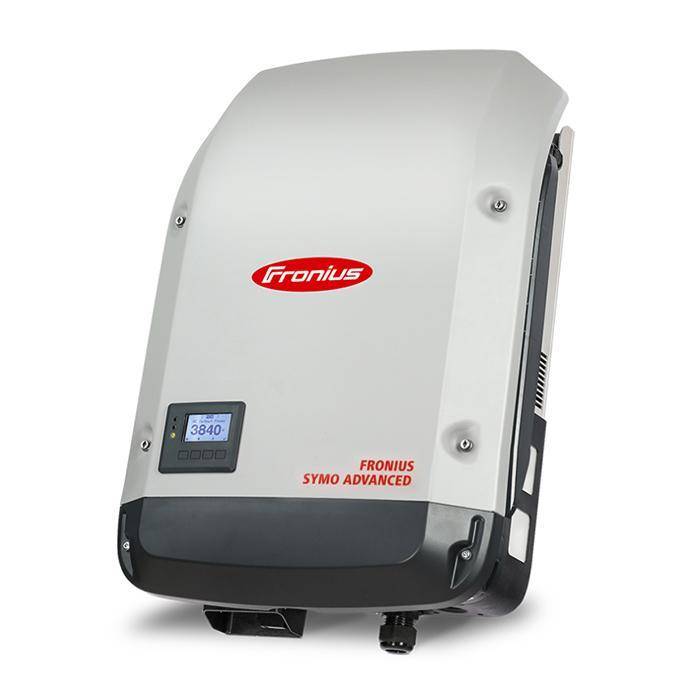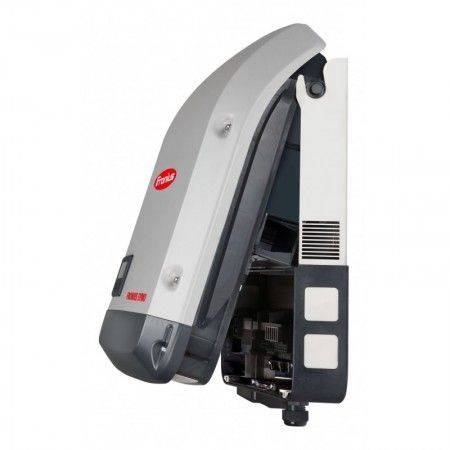No products in the cart.
Convenient Pick-Up at Over 10 Locations Nationwide
Need help? Call us:
+1 1800 212 3434
Fronius Symo Advanced 12kW 3-Phase Solar Inverter (208/240V, Dual MPPT, Grid-Tied)
$3,942.67 Original price was: $3,942.67.$3,284.02Current price is: $3,284.02.
Categories: Commercial Inverters, Inverters for Efficient Energy
GTIN: 4.210.091.801 27 people are viewing this product right now
Fronius Symo Advanced 12kW 3-Phase Solar Inverter delivers 98.1% efficiency, dual MPPT optimization, Wi-Fi monitoring, and grid-tied reliability for home and business solar systems.
Fronius Symo Advanced 12.0-3 208-240 Lite, 12kW 3-phase 208VAC Commercial String Inverter
Powerful, Efficient, and Built for Modern Solar Systems:
The Fronius Symo Advanced 12 kW inverter is designed for both residential and commercial solar applications that demand high performance and reliability. Its transformerless three-phase design ensures smooth grid integration, while dual Maximum Power Point Trackers (MPPTs) maximize energy harvest from solar arrays with varying tilt or shading conditions.
High Efficiency and Smart Energy Conversion:
Delivering up to 98.1% efficiency, the Fronius Symo Advanced minimizes power loss during DC-to-AC conversion, ensuring you get the most energy from your solar panels. The wide 200 V to 600 V DC voltage range supports flexible array configurations, making system design simple and efficient.
Integrated SunSpec Rapid Shutdown and NEC Compliance:
Built to meet Module Level Shutdown (MLS) requirements, the Symo Advanced features an integrated PLC transmitter for SunSpec Rapid Shutdown communication. It complies with NEC 2014, 2017, and pre-2014 standards, making it a dependable option for installations across the U.S.
Advanced Monitoring and Connectivity:
Stay connected with integrated Wi-Fi, Ethernet, and Modbus (SunSpec) interfaces. Through Fronius Solar.web, users can monitor system performance in real time — from home, office, or on the go — and troubleshoot remotely with ease.
Durable, Lightweight, and Easy to Install:
The compact, IP66-rated enclosure protects the inverter against dust, water, and harsh outdoor environments. With its SnapINverter mounting system, installation and servicing are quick and convenient. Its lightweight frame ensures minimal roof load without compromising strength.
Power Conversion Reinvented for Longevity:
With a NEMA 4X enclosure rating and wide operating range, the Symo Advanced can be installed indoors or outdoors, on rooftops or walls. The Fronius Symo Advanced 12 kW inverter is a reliable choice for long-term energy production with low maintenance requirements and robust system compatibility.
-
Rated AC Output: 12,000W (12kW)
-
Voltage Range: 208V / 240V AC, DC Input 200–600V
-
Efficiency: Up to 98.1%
-
MPPT Channels: 2 (Dual MPPT for multiple array optimization)
-
Connectivity: Wi-Fi, Ethernet, Modbus TCP & RTU (SunSpec)
-
Protection Rating: IP66 / NEMA 4X – indoor or outdoor use
-
Design: Transformerless, lightweight, quick-mount SnapINverter system
-
Certifications: UL Certificate
-
Monitoring: Compatible with Fronius Solar.web (web & mobile)
| Rated AC Output Power | 12,000 W |
| Max DC Input Voltage | 600 V |
| DC Voltage Range | 200 – 600 V |
| MPPT Voltage Range | 300 – 500 V |
| Number of MPPTs | 2 |
| Input Current (per MPPT) | 20.75 A |
| AC Voltages | 208 / 240 VAC |
| Frequency | 60 Hz |
| Phase | 3-Phase |
| Efficiency | Up to 98.1% |
| Enclosure Rating | NEMA 4X / IP66 |
| Pallet Quantity | 08 |
| Weight | 98 lbs |
|---|---|
| Dimensions | 28.5 × 20.1 × 8.9 in |
| MPN | 4.210.091.801 |
Related products
Enphase IQ8M-72-M-US 330W Microinverter for 60 & 72 Cell Solar Panels
SMA Sunny Tripower CORE1 STP50-US-41 50kW 1000VDC 480VAC Commercial Inverter
SolarEdge Synergy SE100K-US 100.0KW 3-PH Inverter
Fronius Symo Advanced 10.0-3 |...
$3,325.73 Original price was: $3,325.73.$3,175.25Current price is: $3,175.25.
SolarEdge HD-Wave SE10000H-US ...
$3,250.00 Original price was: $3,250.00.$2,725.00Current price is: $2,725.00.
This website uses cookies to improve your experience.
By using this website you agree to our Privacy Policy.
By using this website you agree to our Privacy Policy.
Ok, I am ready

